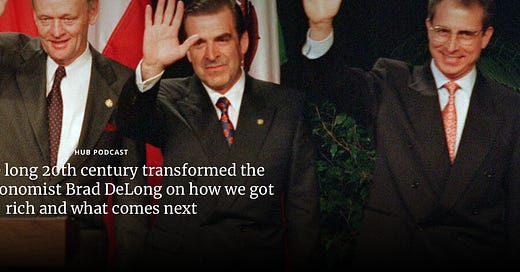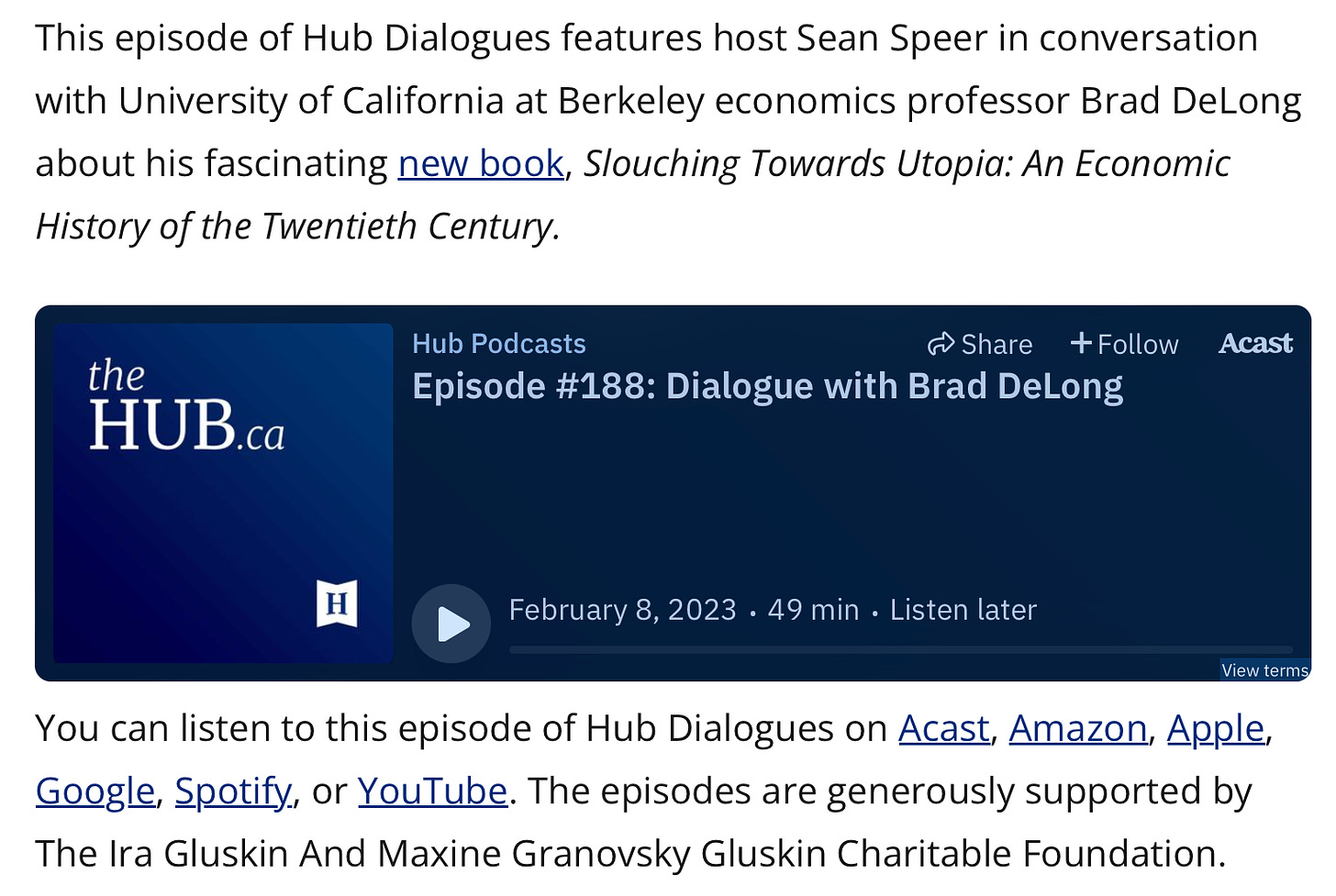How þe Long 20th Century Transformed þe World; & BRIEFLY NOTED: For 2023-02-09 Th
My audio podcast & the transcript from "Hub Dialogues". I was interviewed by Sean Speer. But you should also listen to Martin Wolf talking about his brand-new book, "The Crisis of Democratic Capit...
FOCUS: Brad DeLong & Sean Speer: How the long 20th century transformed the world
<https://overcast.fm/+22os1wWGk>
SEAN SPEER: Welcome to Hub Dialogues. I’m your host, Sean Speer, editor-at-large at The Hub. I’m honoured to be joined today by J. Bradford DeLong, a well-known economic historian and professor at the University of California Berkeley who served as a senior official in the U.S. Treasury Department and is responsible for the widely read economics blog, Brad Delong’s Grasping Reality.
He’s also the author of the fascinating new book, Slouching Towards Utopia: An Economic History of the Twentieth Century, which challenges conventional narratives about the economic story of the past 150 years or so. I’m grateful to speak with him about the book, including what he calls the “long 20th century,” the factors that produced significant economic growth over this period, and why it ultimately failed to produce the utopia that some had anticipated. Brad, thanks for joining us at Hub Dialogues. Congratulations on the book.
BRAD DeLONG: Thank you for inviting me. It’s a great pleasure. I don’t know whether to be congratulated writing it. Certainly, I’m blessed, that when you write a book, you discover how many friends you have and also how many friends the book has. It is more than you would’ve imagined possible in terms of people who take your arguments seriously, who write in earnestly, and who ask their friends to read about it as well.
SEAN SPEER: Well, as listeners will learn, I think that’s for good reason. There’s a ton of insight in the book
ONE VIDEO: Martin Wolf: The Crisis of Democratic Capitalism:
We created far too many angry, disappointed, furious disillusioned people; and they vote for crazies.
Do not be complacent about this! Enough angry and frightened people—and economics is essential to this—and you have serious trouble.
Our operating system—the marriage of liberal democracy and market capitalism—is one of complementary opposites. You cannot have democracy without a vibrant market economy that somewhat depoliticizes the determination of living standards. And not even plutocrats can flourish for long in an authoritarian kleptocracy, whether a Leninist one or otherwise. But liberal democracy and market capitalism are opposites.
Liberal democracy is, today, in “recession”.
The erosion of democracy we are seeing is the result of long-run economic failures in distribution, in mobility, and in growth. A financial crisis in which élites demonstrate themselves unworthy stewards and yet are rescued is an especially dangerous spark for trouble.
Disillusionment and loss of trust in élites led to trust in anti-pluralist crazies who claim that only their supporters are among the real people who are the only ones that matter.
The digital economy has played a huge role in creating a grifter-rentier economy, but more in destabilizing our society’s information nervous system.
If we are to get through this, we have to cool the rage—Trump and Bolsonaro are all about demolishing the “civil” part of politics-as-civil-war.
We need a new and renewed alliance of democracies, but we also need to coöperate with the autocracies on global issues.
A public-spirited and morally-centered élite is essential if our societal operating system is to endure.
Very Briefly Noted:
Michael Spence and Belinda Azenui: America’s Widening Productivity Gap: ‘There was not always a large gap between the tradable and non-tradable sectors. On the contrary, as the chart shows, labor productivity was about $100,000 across the economy in 1998. But by 2021, after more than two decades of steady divergence, per-employee value-added in the tradable sector was nearly double the level in the non-tradable sector…
Gary Marcus: Oops! How Google bombed, while doing pretty much exactly the same thing as Microsoft did, with similar results: ‘Scaling neural network models—making them bigger—has made their faux writing more and more authoritative-sounding, but not more and more truthful. Hallucinations are in their silicon blood, a byproduct of the way they compress their inputs, losing track of factual relations in the process…
Daniel Gros: The Transatlantic Subsidies Race We Need | by Daniel Gros: ‘Rather than offering inefficient subsidies to existing technologies, governments should be funding research and development for new ones. Yet… the EU should not enter a subsidy race with the US, certainly not based on the IRA model. A “green-tech” race...
Dani Rodrik: The Knowledge Mismatch: ‘Context matters: any mismatch between the conditions under which ideas are generated and the specificities of the environment where they are applied can significantly reduce the value of acquiring knowledge…
Barry Eichengreen: Putting America’s Debt in Its Place: ‘Government debt is not soaring…. Urgent needs include renewing US infrastructure, averting a climate disaster, and providing education and training… Interest costs are not exploding…. The CBO’s forecast for growth over the next ten years is 1.7% – higher than the real interest rate…
Dylan Patel & Afzal Ahmad: The Inference Cost Of Search Disruption: ‘Estimating ChatGPT costs is a tricky proposition…. Deploying current ChatGPT into every search done by Google would require 512,820.51 A100 HGX servers with a total of 4,102,568 A100 GPUs. The total cost of these servers and networking exceeds $100 billion of Capex alone, of which Nvidia would receive a large portion…
Dylan Patel: The AI Brick Wall – A Practical Limit For Scaling Dense Transformer Models, and How GPT 4 Will Break Past It: ‘Transformers are a type of multi-layer perceptron… generally considered dense matrix models… fully connected…. This is not how brains in the natural world operate…
Simon Kuper: The urban ideal is a 19th-century city with 21st-century enhancements: ‘Cars, concrete and commuting ruined cities in the 20th century…
Robert Hubbell: Wow!! Biden’s best speech ever!: ‘Biden gets grief for not being a particularly skilled public speaker — but that was an absolutely masterful use of Republican heckling. Biggest moment of the night so far…
Kellan Elliott-McCrea: Software and its Discontents, Part 3: Rising Cost and Elusive Success…
Ari Drennan: The New York Times helped fuel an anti-trans panic in 2022. Will 2023 be any better?…
John Ganz: Reading, Watching 02.05: ‘Jamelle Bouie and I have started a Patreon page to support and complement our podcast Unclear and Present Danger. For the bonus content, we’re going to be primarily looking at Cold War-era thrillers. We recently discussed the 1958 film adaptation of Graham Greene’s The Quiet American. I think it was my favorite episode to date…
¶s:
Dalia Martin: German Deindustrialization Is Still Looming: ‘What explains this gloomy mood? German business leaders first raised the threat of deindustrialization last April, when Germany was considering a boycott of Russian gas…. As it turned out, the apocalyptic scenarios never materialized, even after Russian President Vladimir Putin shut off the Nord Stream pipeline to Germany. Instead, the German government was indeed able to find alternatives…. The decline in gas consumption did not even depress industrial output, as German firms simply became more efficient…
Robin Wigglesworth: Happy China Article IV day everyone: ‘The IMF’s main worry still seems to China’s messy real estate market. It flagged the slowness of restructuring the vast tangled web of property developers — bond prices indicate that 38 per cent of them have or will default — and seems unconvinced by Beijing’s insistence that everything is now fine…. The IMF wants China to set up “more robust mechanisms” to restructure distressed real estate developers, curtail off-balance-sheet borrowing by local governments and state-owned enterprises, and strengthen the banking system to contain the financial stability risks. The tl;dr is that China reopening will naturally boost growth, but there are a lot of gremlins still lurking in the system that could cause problems in 2023…
John Gruber: The New York Times’s ‘Big Tech’ Jihad Has Little Room for Per-Company Nuance: ‘Tripp Mickle, Karen Weise, and Nico Grant, writing for The New York Times in a story that seemingly didn’t need three bylines:
Now chastened, many tech companies have begun the year by championing a new and unfamiliar business strategy: austerity. In recent months, several companies have said they are looking for ways to cut costs and eliminate futuristic projects that have become money pits. Amazon, Alphabet, Microsoft and Meta have each announced plans to lay off more than 10,000 workers…
I’m not sure why Apple is included in this story…. Apple’s Q1 revenue was down 5 percent year over year, yes, but the company claims they took an 8 percent hit from international currency conversion headwinds. The complete shutdown of the massive Foxconn plant responsible for assembling Apple’s flagship iPhone 14 Pro models was a serious setback, but utterly unlike any of the problems facing Amazon, Google, Microsoft, or Meta. But seemingly nothing can stop The Times from presenting “big tech” as a single monolithic narrative…









I'm not a monocausal guy, but the antidemocratic rage is deeply linked to masculinity. Fascism has long included a cult of virility, but today's problems are worse. Rich countries don't need much upper-body strength, and women seem far better acculturated to modern workforces. (This includes the military.) Men still rule the top of the roost, but they're losing everywhere else--and the losers are ANGRY! Men are taking over the traditional destabilizing role of the underemployed overeducated, with an additional direct dollop of violence.
I can't offer much in the way of solutions, although more infrastructure--with associated construction--might help. (Cf. Japan.) It is also noteworthy that the gendered rage is mostly associated with white men. But keep in mind that it is not just class--the rage is very, very gendered.